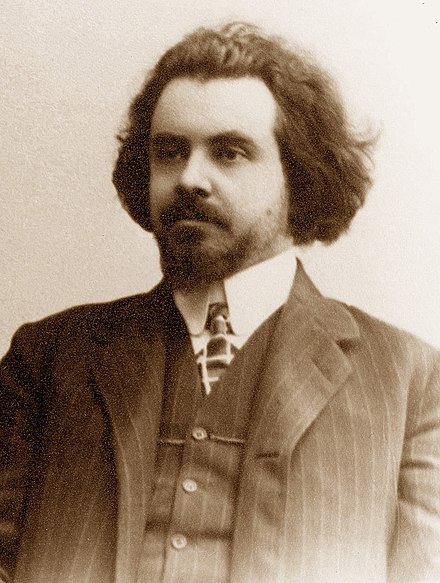Some critics of Marxism and Bolshevism claim that we
are simply dealing with a Christian or pseudo-Christian heresy, a kind of
immanentization of the eschaton. This criticism often comes from libertarians
or conservatives who are atheists. This book, "The Russian
revolution" by Nicolas Berdyaev, also accuses the Bolsheviks for being a
pseudo-Christian heresy. Interestingly, Berdyaev was no atheist. Quite the
contrary. He was a Christian!
Berdyaev was nominally a follower of the Russian Orthodox Church, but in practice he seems to have been an independent-minded thinker, closer to Existentialism than traditional Christianity. Berdyaev emphasized individual liberty, while also calling for a kind of Christian socialism or corporatism. There is also a strong streak of pessimistic Zivilisationskritik in his works. His ideas strike me as contradictory. Interestingly, he opposed Russian nationalism and rather eulogized the Early Italian Renaissance. Berdyaev was forced to leave Russia in 1922, and it seems that neither Bolsheviks nor "White" émigrés liked him. He was too right-wing for the former, and too left-wing for the latter. He died in France in 1948.
"The Russian revolution" is a short book first published in 1931. For good or for worse, Berdyaev doesn't analyze the material or political conditions in Russia which made Bolshevism possible and successful. Rather, he concentrates on Bolshevism as a psychological and "religious" phenomenon. The author sees intriguing parallels between Bolshevism and Russian Orthodox messianism and asceticism, especially in their "anti-establishment" forms. He also compares the atheist and materialist Russian Nihilists of the 19th century with the more sectarian forms of Russian Orthodoxy, and reaches the conclusion that psychologically, the Nihilists were a kind of Christian messianists without Christ. The author sees similarities between Nihilism and Bolshevism, as well.
To Berdyaev, Bolshevism is de facto a kind of religion, an intolerant and absolutist religion, which cannot tolerate other creeds beside itself. It's a kind of "Hebrew" heresy, since it believes in a literal millennium on earth (presumably, the author is an amillennialist). Berdyaev regards Bolshevism as a combination of Russian nationalist millennialism and Marxist internationalism. Had Berdyaev lived today, he would presumably have applied this analysis to the Red-Brown blocs. I don't think Stalin's turn to Greater Russian nationalism surprised him. (During World War II, Stalin even rehabilitated the Orthodox Church!)
"The Russian revolution" speaks for itself, and the above is only a small portion of its contents. Berdyaev had the strange ability to cover a dozen different topics in a short book, and this one is no exception. He does sound meandering and unclear at times, but overall this is the easiest book by Berdyaev I've read. ("The meaning of history" and "The fate of man in the modern world" were harder.) Bertrand Russell believed that Bolshevism was more similar to Islam than to Christianity, so it's interesting to read the work of a Russian-born Christian who sees parallels between Christianity and Communism instead. (Demonic parallels, presumably.)
If Berdyaev's analyses stand closer scrutiny, is (of course) another matter entirely...

No comments:
Post a Comment